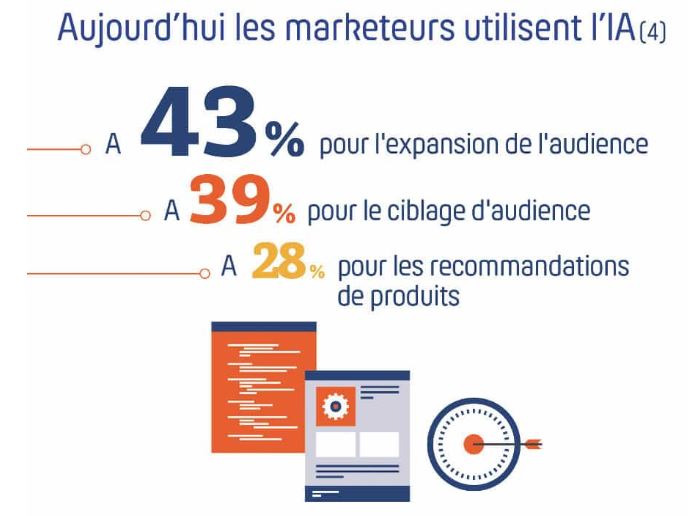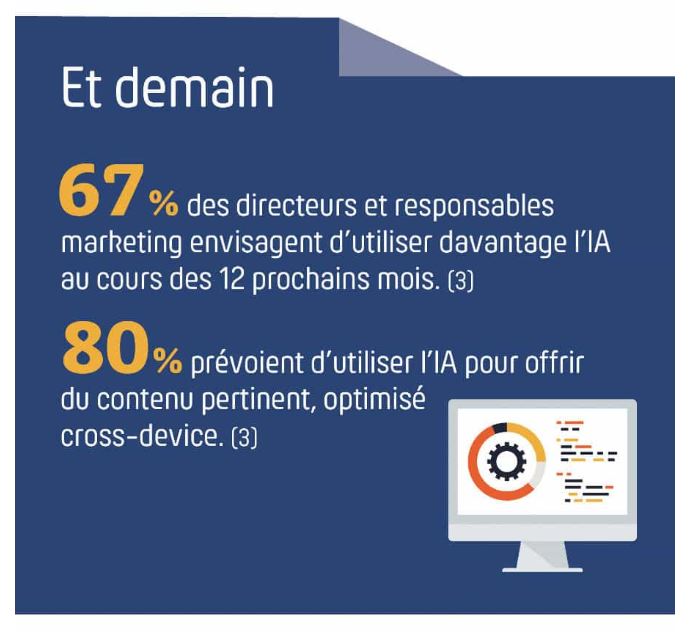Companies that appear to have taken the turn of the Ai…
Few surveys, studies and other barometers explain why artificial intelligence is deployed in companies and especially in their marketing departments. Discover a collection of articles gleaned on the web on the subject :
- “This trend is confirmed by Forrester, who finds that 46% of marketing and commercial departments invest in artificial intelligence, much more than other departments in the company.”
Excerpt from the article The Ai at the service of marketing: key figures for the Ai, published on 1 August 2019 on itsocial.fr.
- “51% [ of marketing professionals] already use Ai.”
Extract from the article State of Marketing artificial intelligence, a priority! Posted June 21, 2017 on frenchweb.fr.
- “By 2020, 30% of B2B companies will be using Ai to increase their sales process.”
CMIT infographic taken over by several media in September 2018, including the article Ai: what impact for marketers? Published in September 2018 at https: / / comarketing-news.fr.
- “Retailers are in favour of artificial intelligence and 67% currently use it.”
Extract from the article The Ai is unanimous among retailers, published on November 9, 2019 on ecommercemag.fr.
… But they are in fact few in number
A quick reading would tend to make us believe that at least every second company uses artificial intelligence in its marketing strategy. We would therefore be easily surrounded by marketers and marketers fed to the Ai who, thanks to their mastery of artificial intelligence, would be able, in particular, to achieve the objectives systematically referred to in this type of strategy.
- Customize their message and increase their transformation rate.
- Reliably predict future customer events.
- Increase customer experience and communicate fluidly with their client (especially through chatbots).
- Etc.
While this is obviously a reality for some companies that are successful in implementing such solutions, let us take some time to try to measure the profile of these companies. The reality, however, seems more contrasting.
Artificial intelligence in marketing remains the prerogative of some companies
The study entitled “The State of Marketing tells us more about the profile of respondents.. The survey covers 3,500 users of Salesforce, 350 of whom are in France, and the majority of respondents are digital natives (57%). Given that 73% of SMEs do not use CRM, the fact that 51% of marketing professionals already use Ai seems to be a bit hasty.
Similarly, according to the ecommercemag.fr article, two thirds of retailers would use the Ai. If we look at the base we interviewed, we fall to 112 respondents, which seems little to be significant. Half of the respondents belong to companies with more than 250 employees.
It therefore seems difficult, according to most of the existing studies, to quantify whether artificial intelligence is actually used in enterprises. The number of biases in all these studies remains very high (number of respondents, respondent profiles, size of enterprises, geographical areas). However, some trends seem to be emerging without the availability of real figures :
- Large enterprises remain the main target group.
- The digital sectors are more advanced.
- The use remains the improvement of customer knowledge for the personalization of messages.
Many difficulties related to the quality of the data
While some companies use or seek to implement IA in their marketing strategy, many still face serious challenges. These can crystallize around the 5 great myths related to artificial intelligence described by a forester analyst. Of these myths, myth number 2 is particularly significant because it bears witness to a much broader reality than the only question of the implementation of artificial intelligence.
Myth n°2 : the Ai is sophisticated mathematics and algorithms.
Reality : the important thing in the Ai is data.
Mick Levy, Innovation manager at Business & Decisions, talks about these difficulties in an interview published on his company’s blog :
« The key to success is to know your data heritage, to master the quality of the data, and to have the ability to activate this data in the service of Artificial Intelligence. »
Trend confirmed by the latest CMIT barometer, carried out in 2019, where 53.7% of the respondents (out of 465 of whom 70% in enterprises with more than 100 employees) state that their database is sufficiently invalid.
The need for good data sourcing
The success of a marketing project in 2020 (improvement of customer knowledge, increase in the rate of transformation of campaigns, detection of business signals), whether or not it includes artificial intelligence, depends first of all on a qualification of the bases.
The first-party data (internal data), the solution essentially passes for processing and the implementation of technological solutions to aggregate, analyze.
For the second and thirdparty data, there are several options available to companies in the B2B. The easiest way, for generic business data (e.g. for targeting prospects), is to recover the data in open data. This article refers, for example, to some open access data.
Base processing is often cumbersome to manage, but it remains an indispensable tool for analysing your client portfolio. Alternatively, a partner specialized in data aggregation may be more cost-effective and, above all, offer more analytical possibilities (cross-referencing, historisation, sectoral databases).
It remains to be seen how to transform this data (obtained on the web, bought or simply retrieved from its own internal systems) into commercial and marketing performance leverage. This is what we will discuss in our next article which will present a precise methodology for customer analysis and detection of exploration pockets.





